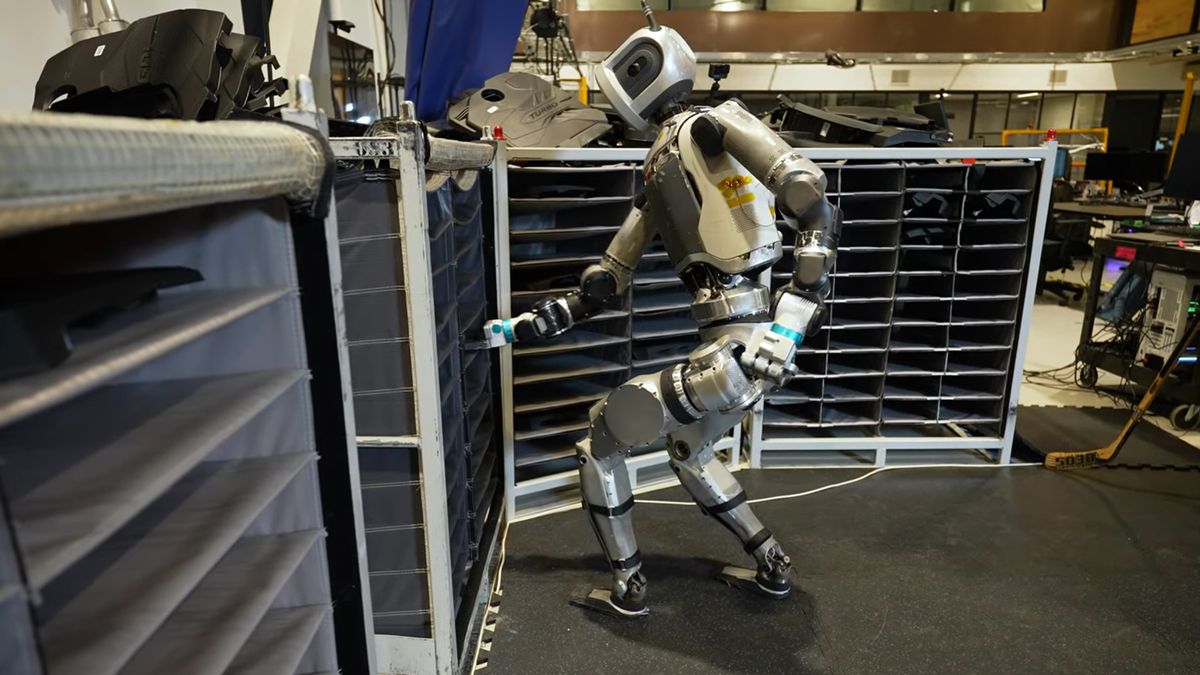For decades now, I’ve been trying to reassure people that the coming robot revolution will not result in job loss for us humans. It’s a notion I firmly believed – or at least did until this morning.
Earlier this week, Boston Dynamics released a fresh demonstration video of its new Atlas humanoid robot (see below). Unveiled earlier this year, this Atlas is a wholesale redesign and radical upgrade from its already impressive and Parkour-performing original Atlas. This new robot looks a lot more like us, though it can move in ways that none of us can.
The latest video is in some ways unremarkable: Another humanoid robot performing drudgery tasks we’d rather not perform. In this case, Atlas is sorting plastic engine covers between a supplier container with horizontal slots and something called a “mobile sequencing dolly” with vertical slots. It does so in the drab environs of what appears to be some sort of manufacturing facility, though it’s probably just a warehouse in Boston Dynamic’s development campus.
What’s remarkable about the nearly three-minute video is that Altas is doing it all autonomously. That’s right, unlike the remote-controlled Optimus robots Elon Musk and Tesla tried to pawn off as self-directed at his “We, Robot” event, there is, according to Boston Dynamics, no one guiding Atlas’ motion or decisions.
In the video, Atlas faces a cart full of plastic engine cover trays. The robot first reaches for one, placing its two ‘fingers’ underneath the cover, and then pulls it forward. Atlas then releases its grip and rotates its hand so that one ‘finger’ is on top and the other is on the bottom, grabs the tray, and pulls it out.
Viewed from a distance, you’d be forgiven for assuming you were watching a slow-moving human worker. Of course, the next bit would belie that notion. Atlas appears to walk backward toward the vertical set of tray holders but also twists its body around as it moves. As I said, it can do some things not possible with a human body.
Before inserting the tray into its new holder, Atlas appears to examine it. Later, we see an inset video feed that shows us how Atlas’s vision system is assessing the size and shape of the tray.
Atlas continues its work, crouching and bending down to grab engine covers on lower shelves. It all goes smoothly, except for one moment when a tray gets caught on the fabric edge of one shelf. Instead of pulling it back slowly, Atltas yanks it back before smoothly inserting the part.
(Image credit: Boston Dynamics)
Like I said, not exactly compelling viewing except when you consider what this means. Robots are widely used in manufacturing and warehouses but they’re often not employed when fine motor controls are required and especially not in places that require on-the-fly decisions.
It’s clear from this video, however, that we’re on the path to where robots that look and work like us will soon stand alongside or replace factory workers. They’ll do the job as well as us but also be able to walk backward while turning their head around 180 degrees.
Plus, with the introduction of generative AI, robots like Boston Dynamics Atlas will be able to report on their work, respond when you ask them questions about production levels, and even join you for some witty banter at lunchtime (they still won’t eat but may plug in for an hour).
So now I have to adjust what I tell people about robots: They won’t take our jobs yet, but in 10-20 years, you may be looking for another line of work.
You might also like
The post Atlas robot’s fully autonomous video is this Halloween’s scariest video appeared first on World Online.

